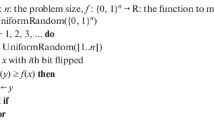Abstract
In this paper we present a novel quantitative measure metric for the “degree of deception” of a problem. We present a new definition for the deceptive degree of a function. We investigate the relationship between the best solution and the monomial coefficients of a function, and we give theorems that show the usefulness of the new definition. The new definition can be applied in three ways: it gives a quantitative measure of deception, it simplifies the evaluation of the GA difficulty, and it gives a relationship between the deceptive degree and the polynomial degree. Furthermore we use the deceptive degree of a function to discuss Goldberg’s Minimal Deceptive Problem and derive the same result as Goldberg did. Finally, we make experiments with a class of fitness functions to verify the relation between the canonical GA difficulty and the deceptive degree of a function for this class of functions.
Preview
Unable to display preview. Download preview PDF.
Similar content being viewed by others
References
Holland, J.H.: Adaptation in Natural and Artificial Systems. The University of Michigan Press (1976)
Bethke, D.: Genetic Algorithm as Function Optimizations. Doctoral Dissertation, University of Michigan. Dissertation abstracts International 41(9), 3503B. University Microfilms No.8106101. (1981)
Goldberg, D.E.: Simple genetic algorithms and the minimal deceptive problem. In: Davis, L. (ed.) Genetic algorithms and simulated annealing, pp. 74–88. Pitman, London (1987)
Goldberg, D.E.: Genetic Algorithm and Walsh Functions: Part I, A Genetic Introduction. Complex Systems 3, 129–152 (1989)
Goldberg, D.E.: Genetic Algorithm and Walsh Functions: Part II, Deceptive and its Analysis. Complex Systems 3, 129–152 (1989)
Hart, W.E., Belew, R.K.: Optimizing an Arbitrary Function is Hard for the Genetic Algorithm. In: Proceedings of the Fourth International Conference on Genetic Algorithm, University of California, San Diego, pp. 13–16 (July 1991)
Spears, W.: Evolutionary Algorithms: The Role of Mutation and Recombination. Springer, Heidelberg (2000)
DeJong, K., Spears, W., Gordon, D.: Using Markov Chains to Analyze GAFOs. In: FOGA- 3, pp. 115–137. Morgan Kaufmann, San Francisco (1995)
Das, Whitley.: The Only Challenging Problems are Deceptive: Global Search by Solving Order-1 Hyperplanes. In: ICGA 1991, pp166–173 (1991)
Grefenstette, J.J.: Deception considered harmful. In: Darrell Whitley, L. (ed.) FOGA-2, pp. 75–91. Morgan Kaufmann, San Francisco (1993)
Grefenstette, J.J., Baker, J.E.: How Genetic Algorithms Work: A Critical Look at Implicit Parallelism. In: Schaffer, J.D. (ed.) Proceedings of the Third International Conference on Genetic Algorithms, San Mateo, CA, Morgan Kaufmann, San Francisco (1989)
Mitchell, M., Forrest, S., Holland, J.H.: The Royal Road Genetic Algorithms: Fitness Landscapes and GA Performance. In: Proceedings of the First European Conference and Artificial Life, Cambridge, MA, MIT Press/Branford Books, Cambridge, MA (1992)
Forrest, S., Mitchell, M.: What Makes a Problem Hard for Genetic Algorithm? Some Anomalous Results in the Explanation. Machine Learning 13, 285–319 (1993)
Davidor, Y.: Epistasis variance: a viewpoint on GA-hardness. In: Rawlins, G.J.E. (ed.) Foundations of Genetic Algorithms, pp. 23–35. Morgan Kaufmann, San Francisco (1991)
Reeves, C.R., Wright, C.C.: Epistasis in genetic algorithms: an experimental design perspective. In: Eshelman, L.J. (ed.) Proceedings of the 6 th International Conference on Genetic Algorithms, pp. 217–224. Morgan Kaufmann, San Mateo (1995)
Naudts, B., Suys, D., Verschoren, A.: Epistasis as a Basic Concept in Formal Landscape Analysis. In: Baeck, T. (ed.) Proceedings of the 7th International Conference on Genetic Algorithms, pp. 65–72. Morgan Kaufmann, San Francisco
Leblanc, B., Lutton, E.: Bitwise regularity and GA-hardness. In: ICEC 1998, Anchorage, Alaska (May 5, 1998)
Homaifar, A., Xiaoyun, Q., Fost, J.: Analysis and Design of a General GA Deceptive Problem. In: Proceedings of the Fourth International Conference on Genetic Algorithm University of California, San Diego, pp. 13–16 (July 1991)
Xiaoping, C. Liming.: Genetic Algorithm.Theory, Application and Software Implementation. Xi.an University of Communication Publishers (2002) (in Chinese)
Liepins, G. E., Vose, M. D.: Representational Issues in Genetic Optimization. Journal of Experimental and Theoretical Artificial Intelligence, 101–115, 1990(2)
Whitley, L.D.: Fundamental Principles of Deception in Genetic Search. In: Rawlins, G. (ed.) Foundations of Genetic Algorithms, Morgan Kaufmann, San Mateo (1991)
Author information
Authors and Affiliations
Editor information
Editors and Affiliations
Rights and permissions
Copyright information
© 2005 Springer-Verlag Berlin Heidelberg
About this paper
Cite this paper
Li, Yq. (2005). The Deceptive Degree of the Objective Function. In: Wright, A.H., Vose, M.D., De Jong, K.A., Schmitt, L.M. (eds) Foundations of Genetic Algorithms. FOGA 2005. Lecture Notes in Computer Science, vol 3469. Springer, Berlin, Heidelberg. https://doi.org/10.1007/11513575_16
Download citation
DOI: https://doi.org/10.1007/11513575_16
Publisher Name: Springer, Berlin, Heidelberg
Print ISBN: 978-3-540-27237-3
Online ISBN: 978-3-540-32035-7
eBook Packages: Computer ScienceComputer Science (R0)




